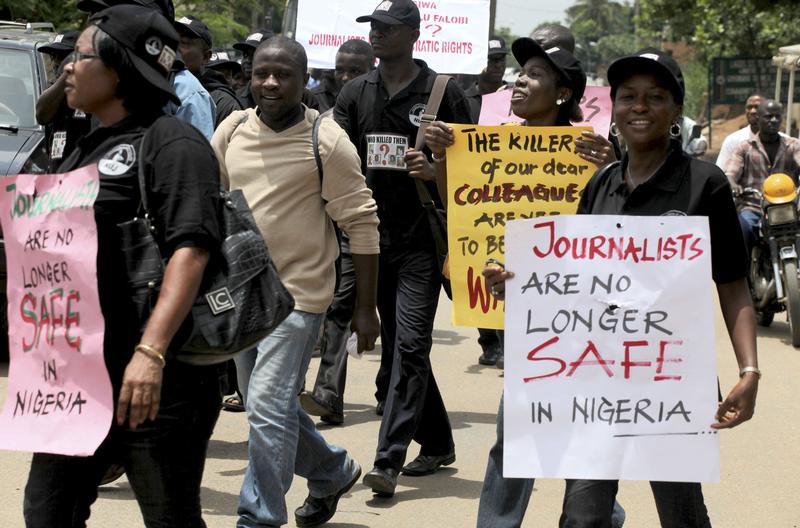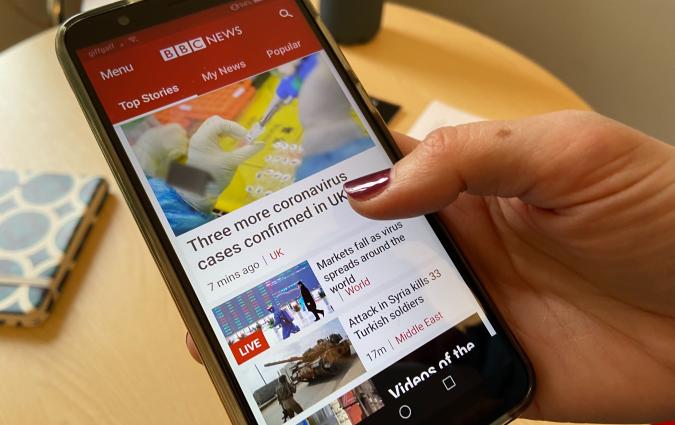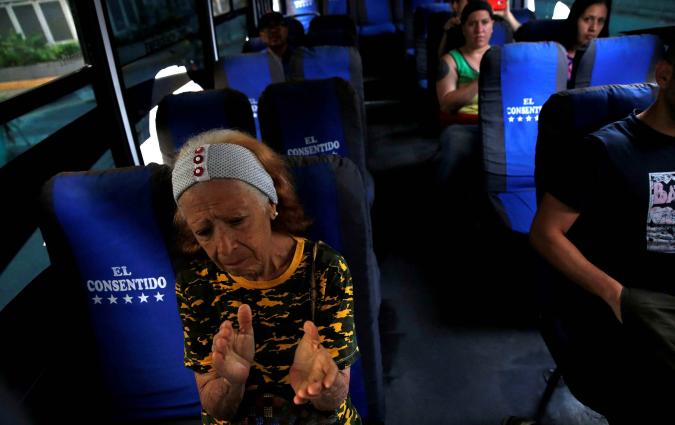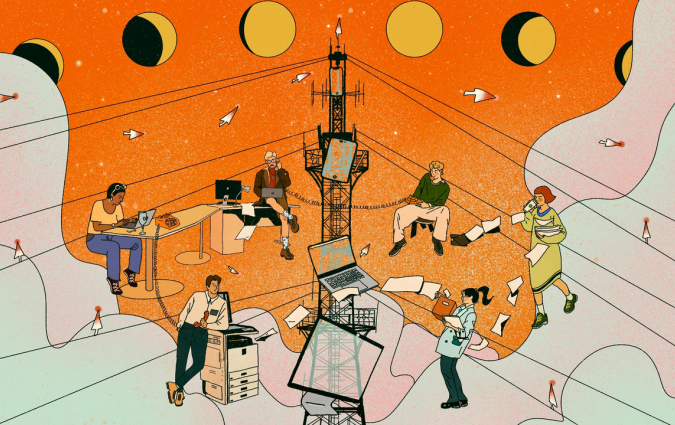As Nigeria approaches the next elections, journalists are increasingly under threat

Journalists protest to mark World Press Freedom day in Lagos. REUTERS/Akintunde Akinleye
In August 2020, Nigerian journalist Sikiru Obaraseye was attacked and brutalised by four police officers. Obarayese, a journalist with the Daily Post, a leading media outlet, was assigned to report on the enforcement of COVID-19 restrictions in a suburb in Southwest Nigeria. A police officer, who was part of a team assigned to enforce the rules, questioned him after he photographed police officers beating people for violating mandatory mask regulations.
“That attack left me with injuries on my elbow, a scratch on my right leg, and pains in my knees,” says Obarayese, who thinks the attack was ordered by a local government official in the region.
On October 20, 2021, about a year after the first attack, Obarayese was attacked again. He was covering a memorial demonstration when a few police officers instructed him to leave. After filming, a policeman shoved him from behind ordered others take him to a nearby police van, where at least six officers beat him with batons and the butt of their guns, forced him into their van, and drove him off to the station.
“It was dreadful and fearful,” he says. “At the station, I was punched repeatedly in the face by an officer. Others threatened to kill me if I did not cooperate. They took my phone and didn't allow me to call anyone until I was brought to court.” A magistrate court charged him with “breach of peace for videoing the Divisional Police Officer.” A few days later, the police withdrew the charges and released him.
A familiar story
Obarayese is not alone. In the last few years, a growing number of journalists are under pressure in Nigeria, where press freedom is in decline. Many journalists have been attacked and media organisations raided or intimidated by security agents.
The 2021 World Press Freedom Index compiled by Reporters Without Borders (RSF) ranked Nigeria 120th of the 180 countries sampled. “Nigeria is now one of West Africa’s most dangerous and difficult countries for journalists, who are often spied on, attacked, arbitrarily arrested or even killed,” RSF said.
In April 2021, Olatunde Odimayo, an investigative journalist and the head of the news desk at Grace FM, a local radio station, was attacked by unidentified men after an investigation that exposed the use and sale of illicit drugs in a brothel. The investigation resulted in the government's anti-drug agency raiding the brothel and making arrests. Odimayo tells me that members of the syndicates were not happy with the outcome of his story and that’s why they decided to hit back at him.
“It’s unfortunate that we [journalists] are seen as enemies because of the work we do,” he says. “The attacks on journalists can’t solve any problem. It’s obvious that press freedom is shrinking in the country but we must continue reporting the truth.”
Three journalists shot and killed
In October 2020, Pelumi Onifade was reporting on the looting of COVID-19 relief supplies from a warehouse in Lagos, Southwest Nigeria when a team of security agents stormed the venue and started shooting. According to eyewitnesses, he was shot in the back and his body taken away in a police van. A week later, Onifade’s body was found in a morgue.
In January 2020, Alex Ogbu, a freelance journalist, was shot and killed by security agents while covering a protest by members of the Islamic Movement of Nigeria (IMN) in Abuja, Nigeria’s capital city. Since 2015, the IMN, a Shia Muslim group, have been demanding the release of Ibrahim El-Zakzaky, their spiritual leader, who was in military detention. The demonstrations often turned violent. More than 40 protestors have been killed and dozens more arrested since the protests started.
The police denied any involvement and said Ogbu’s death was caused by him falling and striking his head on the ground. However, an independent autopsy showed that Ogbu’s body presented gunshot injuries at the time of his death.
A few months before, in July 2019, Precious Owolabi, an intern with Channels TV, a private television station, was also shot and killed while covering protests by members of the IMN, according to eyewitnesses at the scene. The police said he was shot by the protestors and denied any responsibility.
Data from the Committee to Protect Journalists (CPJ), a journalism nonprofit working to protect press freedom around the world, shows that 12 Nigerian journalists were killed from 1992 to 2020. Three more have been killed from June to November 2021.
No one has been arrested, prosecuted, or held accountable for these killings. “When journalists are attacked in the course of their work, it is far too rare that those responsible are held accountable,” says Jonathan Rozen, Senior Researcher at CPJ. “The criminalisation of journalism remains a major concern in Nigeria, but we continue to engage authorities on the ground whenever they are involved in press freedom violations.”
“The media needs to ask a lot of questions about why this is happening in a democracy,” says Lanre Arogundade, executive director of the International Press Centre (IPC). “It is a fact that press freedom is not properly guaranteed in this country.”
In January 2022, Arogundade was arrested by the state security service upon his return from the Gambia, where he had gone to train local journalists on conflict reporting. They told him that “those who are anti-establishment will go through such experiences,” referring to activists and media advocates who scrutinise or criticise the government.
How to protect journalists
Media groups and local journalism unions have been advocating for the protection of journalists in Nigeria. When Obarayese was attacked, the local union stood up for him, released a statement, demanded that the police apologise to him and asked journalists to boycott their activities.
Apart from engaging authorities, the CPJ provides resources, safety tips, security and digital training. Rozen said the CPJ continues to advocate for press freedom under its three pillars: reporting, advocacy and emergency response. “We are going to continue documenting and investigating these cases and engaging with authorities to explain what it means to protect media workers and to ensure that security forces are protecting press freedom in Nigeria and not attacking journalists.”
Rozen said digital training for journalists is important as the government often tracks their activities and movements using their devices. “We can see the continuous use of the cybercrime laws to criminalise and jail journalists in Nigeria. We have also seen the continued efforts to reveal journalists' sources to seize their devices,” he says. “This remains a major concern including the use of spyware across the continent and digital forensic technology that is used to extract information from journalists' devices. Privacy as a pillar of press freedom is under attack around the world.”
“Journalists can’t take their safety for granted,” says Arogundade, who has been working with his team to organise training for journalists on how to stay safe in the field while on reporting assignments. “Journalists should always speak up against threats, but media professional bodies and associations should speak out more. We need answers from the government.”
The emphasis on training is important as Nigeria prepares for the general elections in 2023. In 2019, journalists and media workers covering the election were attacked by security agents and political thugs. According to Arogundade, the IPC documented that over 200 journalists were affected by electoral violence.
“Most journalists and media organisations are always on duty during elections. Will their safety be guaranteed?” he says. “We are not trying to portray Nigeria in a bad light when we talk about the shrinking of press freedom in the country. The challenges we face in this regard are enormous.”
After the attacks, Obarayese says he was affected psychologically. “I suffered emotionally too,” he says. “It changed my way of approaching assignments and I felt discouraged when the incident happened, but I have gotten over it.” He thinks that the reason why officials attack journalists is to make them feel threatened.
“Journalists and media organisations need to be united to fight the assault on press freedom and impunity in the country,” he says. “The Constitution should prescribe punishment for press freedom offenders.”
Patrick Egwu is a Nigerian freelance investigative journalist based in Toronto, Canada where he is currently a William Southam Journalism Fellow at Massey College, University of Toronto. Formerly based in Johannesburg as an Open Society Foundation Fellow, his reporting is at the intersection of human rights, social justice, global health, migration, conflict and development in sub-Saharan Africa, and has been published by Foreign Policy, NPR, Daily Maverick, African Arguments, Rest of World, World Politics Review, Global Investigative Journalism Network and elsewhere. You can find his work here.
In every email we send you'll find original reporting, evidence-based insights, online seminars and readings curated from 100s of sources - all in 5 minutes.
- Twice a week
- More than 20,000 people receive it
- Unsubscribe any time







